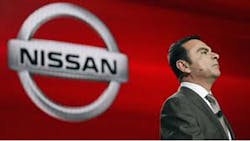Nissan Can Manage Just Fine without Ghosn at the Wheel
Nissan Motor Co., which has counted Carlos Ghosn as chairman, chief executive officer and president for most of the period since Renault SA saved it from the brink of collapse in 1999, is going to have to make do with less of him.
While Ghosn will hold on to the chairman role, Hiroto Saikawa -- a former purchasing chief who's been with Nissan since the 1970s and frequently acted as his lieutenant -- will take over as chief executive and president. Investors weren't happy, pushing the shares down as much as 1%.
They should relax. If there's one thing that's clear from the voluminous literature on the management secrets of Carlos Ghosn, it's that he's always been comfortable delegating. All his key decisions for Nissan are made during the one week a month he spends in Tokyo, he told Harvard Business Review last October.
Once his flight takes off, Nissan is out of sight, out of mind, judging by his comments in a 2014 interview for LinkedIn: "When I'm in Paris, I'm making decisions for Renault. And when I am in Russia, I'm making decisions, eventually, for AvtoVAZ. I don't mix the different responsibilities because I just want to make sure the different teams in charge feel responsible and there is no confusion between the different companies."
Saikawa is anything but a neophyte. He rose under Ghosn as a manager of the carmaker's purchasing operation, one of the toughest jobs in the business during the early 2000s when breaking Nissan's codependent relationship with its supply chain was a paramount responsibility.
He's since held many of the top jobs in the company: It's just under 10 years since Saikawa assumed oversight of Nissan's North American operations, its biggest unit, from Ghosn, and he was named as co-CEO of the entire business in October.
Ghosn also has other fish to fry. As chairman of Mitsubishi Motors Corp., he has to bring that business to heel as well as integrate it with Renault and Nissan, particularly in areas like its expertise in plug-in hybrid vehicles.
Renault-Nissan-Mitsubishi is now the biggest producer of electric cars worldwide, but after early success with the Nissan Leaf it's been flagging of late in the face of tougher competition.
Like any powerful emperor, Ghosn also needs to give some thought to his succession. Among major automobile executives, only Daimler AG CEO Dieter Zetsche and Ford Motor Co. Chairman Bill Ford have been at the helm for more than a decade. A Renault-Nissan-Mitsubishi that goes to pieces when its boss retires will be no use to anyone.
"I became CEO at 45, and I was working like a beast," Ghosn said in a 2012 interview with McKinsey. "You can't do that when you're 60 or 65." He turns 63 next month.
Nissan is no one's idea of a glamorous company. Investors' rosy expectations of Tesla Inc. have meant that the Palo Alto carmaker is now worth more than its Yokohama counterpart, despite the fact that its annual production is equivalent to about five days' worth of Nissan's output. But boring reliability, in businesses as in automobiles, has its virtues -- and Nissan has that in spades.
Ending the hierarchical culture of the old Nissan is typically seen as one of the secrets of the company's revival. It should get on just fine now without its Franco-Brazilian shogun.
By David Fickling
